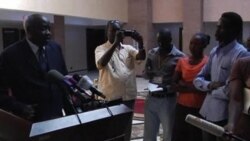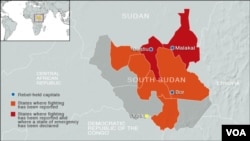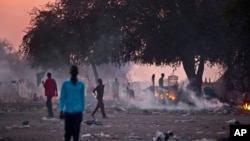Delegates for South Sudan's government and the rebels trying to overthrow it are considering a cease-fire proposal.
Regional mediators from the Intergovernmental Authority on Development (IGAD), which has been negotiating a peace framework in Addis Ababa after talks had been delayed for days, later flew to South Sudan's capital, Juba, to meet with government officials there.
IGAD, an East African bloc, says the talks are focused on achieving a cease-fire and determining the status of pro-rebel officials detained by the government last month.
The rebels are insisting the detainees be released. The government says it can release them only after "legal procedures" are carried out.
The violence in South Sudan has killed more than 1,000 people and forced about 200,000 from their homes.
In a Tuesday briefing, U.N. deputy spokesman Farhan Haq said there are reports of continued fighting near the rebel-held town of Bor, capital of Jonglei state.
Haq said U.N. peacekeepers reported seeing villages burned and looted in Unity state, and local officials report severe food and water shortages.
Sudan's President Omar al-Bashir on Monday visited South Sudan, where he thanked South Sudanese President Salva Kiir for a "warm welcome" and pledged his government will not support rebels in South Sudan or in any neighboring country.
In the past, the two Sudans have accused each other of supporting rebels on the other's territory.
In an interview with VOA English to Africa, Ahmed Bilal, Sudan's Minister of Information, was asked if Khartoum will send any forces across the border.
"We will not, actually, unless, of course, the peace council in the [African Union] considered this and decided to send troops or something like that," he said. "But now, separately, we will not send any troops to the South."
South Sudan's unrest began December 15 when renegade soldiers attacked an army headquarters. President Kiir accused former vice president Riek Machar of a coup attempt. Machar has called for the army to overthrow the president.
Witnesses say some of the violence is ethnically motivated, with supporters of Mr. Kiir, a member of the Dinka tribe, and supporters of Machar, from the Nuer tribe, targeting each other.
The U.N. refugee agency says it is struggling to keep up with the humanitarian needs of the thousands of South Sudanese refugees who have crossed into Uganda to escape violence. The agency says refugees are now crossing into Uganda at a rate of up to 2,500 a day.
The agency also says a growing number of refugees are also making their way into Ethiopia and Kenya.
PHOTOS: Crisis in South Sudan















